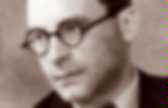

Project MUSE. Complete Catalogue. Brain Pickings. How to Listen to Music: A Vintage Guide to the 7 Essential Skills. By Maria Popova “Respond esthetically to all sounds, from the hum of the refrigerator motor or the paddling of oars on a lake, to the tones of a cello or muted trumpet.”
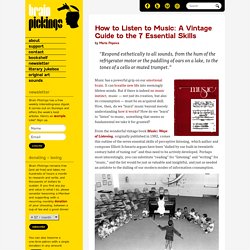
Music has a powerful grip on our emotional brain. It can breathe new life into seemingly lifeless minds. But if there is indeed no music instinct, music — not just its creation, but also its consumption — must be an acquired skill. How, then, do we “learn” music beyond merely understanding how it works? The Modern Word. The Banality of Hannah Arendt. Ride of her life: Hannah Arendt (Barbara Sukowa) rides the Egged bus to Jerusalem to cover the Eichmann trial "So," the motherly brunette asks conspiratorially, a billiard cue slung below her arm, "Was he the greatest love of your life?

" No, it's not a scene from the latest chick flick; it's from Hannah Arendt, Margarethe von Trotta's new biopic about the German-Jewish political theorist. The questioner is the American critic and novelist Mary McCarthy, and she is referring to none other than Martin Heidegger, the controversial Nazi-aligned philosopher. The film's central plotline follows Arendt's coverage of the 1961 Eichmann trial and its aftermath. Particular attention is given to disputes about the "banality of evil" — Arendt's notorious thesis intended to explain why the Nazi leader took care of the trains while letting the categorical imperative run on empty. Both Arendt and McCarthy are the subject of seemingly endless fascination and study. McCarthy's objection was prescient. Nicholas Carr's Blog. Miklós Pál – TUS ÉS ECSET - Liget Műhely - szellemi üzem.
A LIGET e-könyv sorozata Csodáljuk-e inkább Kínát, vagy félünk tőle?
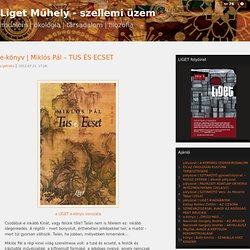
Talán nem is félelem ez: inkább idegenkedés. A régitől – mert bonyolult, érthetetlen jelképekkel teli; a maitól – mert túl gyorsan változik. Talán, ha jobban, mélyebben ismernénk… Miklós Pál a régi kínai világ szerelmese volt: a tusé és ecseté, a festők és írástudók művészetéé, a kifinomult formáké, a jelképes nyelvé, amely nemcsak tusfestményekben és kalligráfiákban jelent meg, hanem a szerelem művészetében is, a buddhizmus Kínában kialakult ágában, a chanban is, az életmódban vagy az időszemléletben is.
Az elektronikus Tus és Ecset groteszknek tűnhet, de Kína éppen azáltal mutatja meg rejtőzködő energiáit, hogy nem zárkózik el többé a modern eszközöktől, és a fiatalok computer-ecsettel tanulják meg írni a régi írásjegyeket. „A praktikus haszon…meglehetősen konkrét eredményekkel fogalmazódik meg a taoistáknál, a hosszú élet biztosítékát adja a szerelem helyesen művelt gyakorlata”. És hogy Kínában zsidók is éltek? James Joyce' dirty letters. Dublin 2 December 1909 My love for you allows me to pray to the spirit of eternal beauty and tenderness mirrored in your eyes or fling you down under me on that softy belly of yours and fuck you up behind, like a hog riding a sow, glorying in the very stink and sweat that rises from your arse, glorying in the open shape of your upturned dress and white girlish drawers and in the confusion of your flushed cheeks and tangled hair.
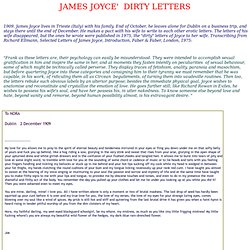
It allows me to burst into tears of pity and love at some slight word, to tremble with love for you at the sounding of some chord or cadence of music or to lie heads and tails with you feeling your fingers fondling and tickling my ballocks or stuck up in me behind and your hot lips sucking off my cock while my head is wedged in between your fat thighs, my hands clutching the round cushions of your bum and my tongue licking ravenously up your rank red cunt. You are mine, darling, mine! I love you. Dublin 3 December 1909 ……., you seem to turn me into a beast. Great Books of the Western World.
The Great Books (second edition) Great Books of the Western World is a series of books originally published in the United States in 1952 by Encyclopædia Britannica Inc. to present the Great Books in a single package of 54 volumes.
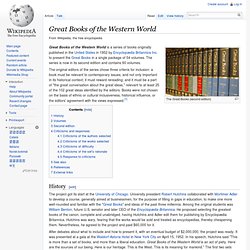
The series is now in its second edition and contains 60 volumes. The original editors of the series chose three criteria for inclusion: a book must be relevant to contemporary issues, and not only important in its historical context; it must reward rereading; and it must be a part of "the great conversation about the great ideas," relevant to at least 25 of the 102 great ideas identified by the editors.
Books were not chosen on the basis of ethnic or cultural inclusiveness, historical influence, or the editors' agreement with the views expressed.[1] History[edit] After debates about what to include and how to present it, with an eventual budget of $2,000,000, the project was ready. Sales were initially poor.